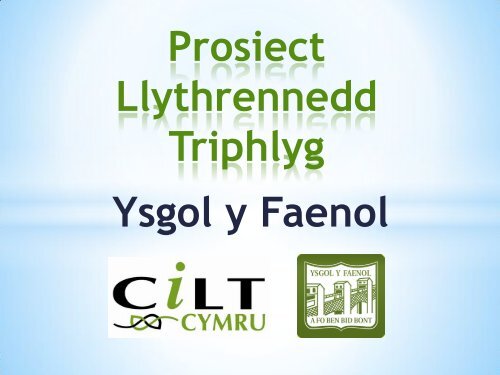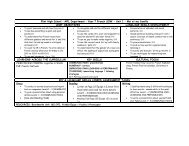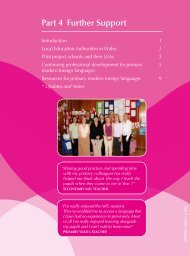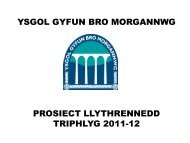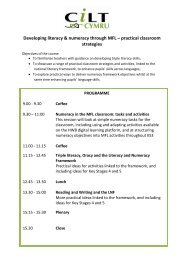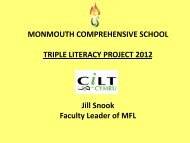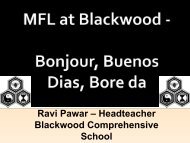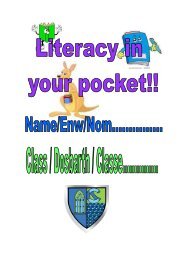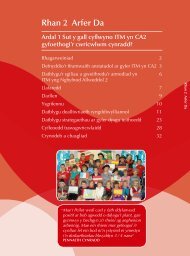Prosiect Llythrennedd Triphlyg Ysgol y Faenol
Ysgol y Faenol Prosiect Llythrennedd Triphlyg - CILT Cymru
Ysgol y Faenol Prosiect Llythrennedd Triphlyg - CILT Cymru
You also want an ePaper? Increase the reach of your titles
YUMPU automatically turns print PDFs into web optimized ePapers that Google loves.
<strong>Prosiect</strong><br />
<strong>Llythrennedd</strong><br />
<strong>Triphlyg</strong><br />
<strong>Ysgol</strong> y <strong>Faenol</strong>
<strong>Ysgol</strong> y <strong>Faenol</strong><br />
<strong>Ysgol</strong> Y <strong>Faenol</strong> is a primary school, located in<br />
Penrhosgarnedd near the City of Bangor in<br />
Gwynedd.<br />
It has around 230 pupils from nursery age to year<br />
6. The school is under the voluntary control of the<br />
Church in Wales. It is a bilingual School.
The school’s linguistic background<br />
Our situation is very different from most of the other schools in the county<br />
because of the multicultural nature of our school. As the school is located<br />
close to the university and the hospital, we have a high percentage of<br />
families who come from various countries around the world.<br />
Arabic<br />
Hindi<br />
French<br />
Malay<br />
Telagu<br />
Singhalese<br />
Bangla<br />
Kurdish<br />
Urdu<br />
Pushtu<br />
Mauritian<br />
German<br />
Farsi<br />
Polish<br />
Yoruba Turkish Chinese Afrikaans Burmese<br />
As a result a number of languages are spoken throughout the school.
The school’s linguistic<br />
background<br />
• Only 10% of pupils come from homes where Welsh is the first<br />
language.<br />
• Over 25% of pupils come from a variety of ethnic backgrounds.<br />
As a result of our linguistic background, a high percentage of our pupils<br />
learn either Welsh or English as a second language and therefore,<br />
developing our pupils’ literacy skills has always been one of our priorities.
Overview of the Triple<br />
Literacy Project<br />
As a high percentage of our children learn Welsh or English as<br />
a second language from the foundation phase onwards, we<br />
decided to include the infants in our project.<br />
‣Year 6 learning a modern foreign language once a week.<br />
‣ A week to celebrate MFL.<br />
‣Converting story time in the Foundation phase.<br />
‣
French Lessons for Year 6<br />
•We arranged to have a French teacher from a local<br />
comprehensive to help give French lessons to Year 6<br />
•The Year 6 teacher and the French Teacher produced a<br />
scheme of work for the year.
•The Year 6 teacher observed the French teacher teaching<br />
French.<br />
•Both teachers team taught the pupils.<br />
•They shared ideas for valuable resources, useful games,<br />
cultural teaching strategies and good websites.
•Pupils were shown how to make the link between Welsh,<br />
English and French during the lesson.<br />
•Classroom displays were created to help pupils make the link<br />
between the three languages.
This project has lead to high level French lessons allowing<br />
pupils to practise MFL in a fun and varied environment.
Celebrating European<br />
Languages<br />
•Staff meeting to plan the European Languages week.<br />
•Choose a country for each class to concentrate on: The<br />
Netherlands, Ireland, Spain, Italy, Austria, Russia, Greece and<br />
France.<br />
•Teachers planned tasks, activities and events to be held during<br />
the week.<br />
•Letter sent to teachers informing them of the European week<br />
and asking for any support to help to learn the languages<br />
involved.
On the first day of the celebrations, pupils were invited to<br />
wear the colours that their class was studying.
During the week, pupils were given a lot of<br />
valuable experiences whilst learning about the<br />
various countries in Europe.
Parents visited the classes during the week to<br />
learn a bit about the country and the language.
And during the week, the pupils had a lot of fun<br />
learning to speak a new language.
Language of the term<br />
As the week celebrating European languages had been so successful<br />
it was decided that each class would continue to learn the language<br />
for the remainder of the term..
Story time<br />
Transforming story time within the foundation stage by<br />
introducing stories in some of the pupils’ mother tongues<br />
• Teachers note the first language of some of the pupils in<br />
their classes.<br />
•Purchase bilingual books. [Arabic/English Chinese/English<br />
Polish/English French/English]
Celebrating the pupils’<br />
mother tongue<br />
• Asking parents to come into the class to help to introduce<br />
stories in their first language.<br />
• Teachers and parents working together to plan the story<br />
session.
Creating bilingual listening<br />
resources<br />
•There was potential to create bilingual resources to use in the<br />
classroom.<br />
•The story time activity was developed further by recording<br />
children's story time in the junior school and telling the stories in<br />
their first language so that the children who were learning English<br />
as a second language would have the opportunity to listen to stories<br />
in English and in their own language.
Language mats and games<br />
•There was potential to use the language skills of our parents in<br />
order to create more multilingual resources to support our<br />
second language children.<br />
•The stories that were being introduced in all classes across the<br />
foundation stage were noted, and the teachers went on to<br />
create story mats have simple games based on these stories.<br />
•The key vocabulary related to each story was noted in Welsh<br />
and English on the resources. The Welsh vocabulary were<br />
noted in red and the English vocabulary in black.<br />
•Parents were asked to add vocabulary in their mother tongue in<br />
blue on the resources too.
•These resources are a help to the second language children<br />
because they allow pupils to make a connection between their<br />
first language and the new language they are learning in the<br />
classroom.<br />
•These resources have also engaged the other pupils and they<br />
are also used as a resource for teaching the first language to<br />
the rest of the class.
Pupils using the<br />
multilingual<br />
resources
Benefits of the triple literacy<br />
project<br />
French Lessons for year 6;<br />
‣Valuable professional development for a year 6 teacher, as he gains<br />
experience of observing and learning together with the French teacher<br />
from the local secondary school.<br />
‣Create a strong link with the local secondary school, developing good<br />
transition arrangements between KS2 and KS3.<br />
‣Many good ideas for activities and resources to use in lessons were<br />
shared and as a result, the standard of French lessons have improved.<br />
The year 6 teacher felt he was much more confident in teaching the<br />
subject this year and knows how to extend the pupils.<br />
‣The attitude of the children towards learning French is very positive -<br />
96% of year 6 pupils say they enjoy their French lessons.<br />
‣Contributes towards improving the literacy skills of our pupils – there<br />
has been a significant increase in the uptake of level 5 in Welsh and<br />
English.<br />
‣ Pupils leaving our schools with a good level of French.
Benefits of the triple<br />
literacy project<br />
Story time, audio stories, games and language mats.<br />
‣Raising children's awareness of other first languages that exist in the<br />
classrooms<br />
‣Improve pupils' attitude towards other languages and cultures in the<br />
school.<br />
‣ Instils a sense of pride in their first language for EAL pupils.<br />
‣ Develops an effective partnership with the parents of those who have<br />
traditionally tended to be marginalized in the school community.<br />
‣Multilingual resources enables non-English parents to be actively<br />
involved in their children's learning.<br />
‣Development in the language acquisition skills of EAL pupils. The<br />
multilingual resources promotes development in literacy skills by<br />
encouraging the EAL pupils to transfer concepts and skills developed in<br />
one language into the other.
Benefits of the triple<br />
literacy project<br />
Celebrating European languages week / language of the term<br />
‣ Expands the horizons of our pupils.<br />
‣ Improves pupils' awareness of other cultures<br />
‣Nurtures a love for learning new languages - 90% enjoyed<br />
learning a new language during the week and 76% believe<br />
that learning different languages is important.<br />
‣ Creates a better link with parents.<br />
‣Enriches our curricular provision by offering real<br />
experiences to the pupils.<br />
‣Create a sense of respect for other languages and cultures.


